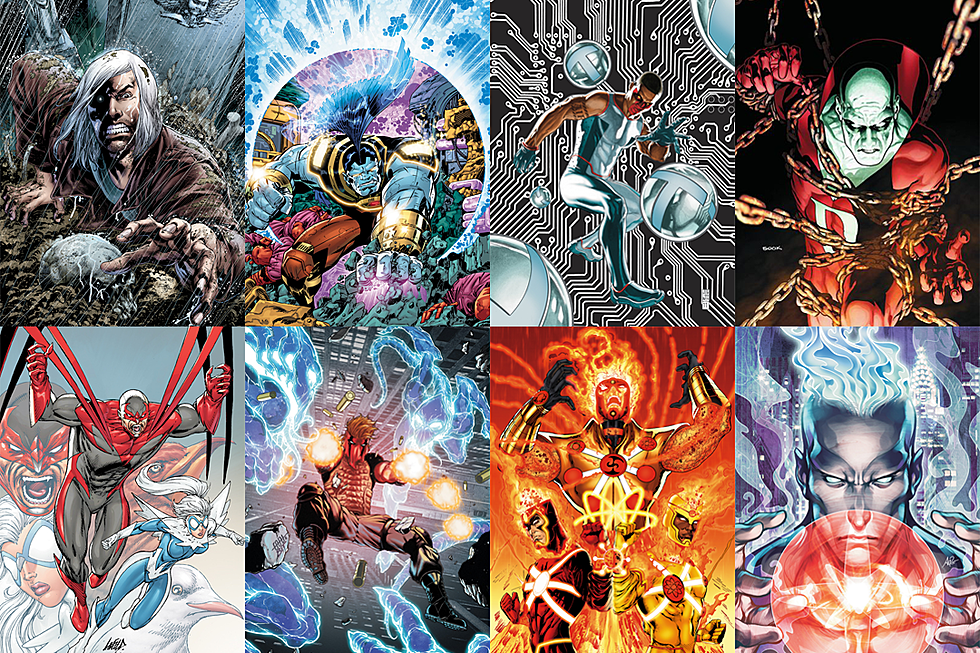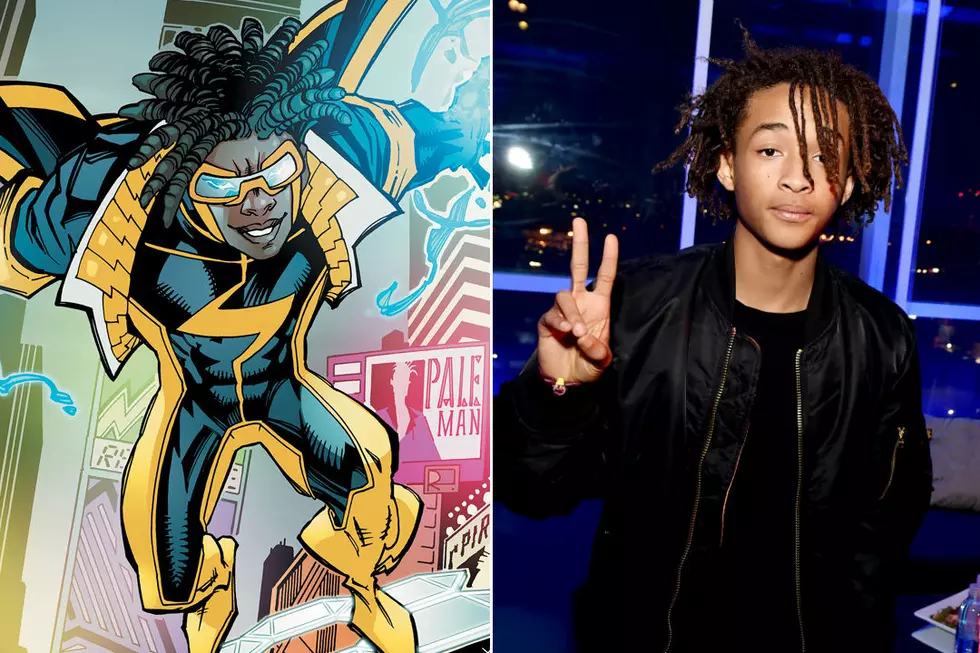
Former ‘Static Shock’ Writer John Rozum on ‘What was Really Going on Behind the Scenes’
 Mister Terrific and Static Shock, two of the very few "solo" series starring African American superhero characters in lead roles, were among the six New 52 titles canceled by DC Comics earlier this month. The loss of these titles was greeted by ComicsAlliance readers with several levels of disappointment. Our comments section under the cancelation post indicated that DC fans were sad to lose spotlights for these well-liked characters and ethnic diversity in superhero comics, but CA readers also weren't terribly surprised by the news, either, as many of them agreed the Static Shock and Mister Terrific comics just weren't very good.
Mister Terrific and Static Shock, two of the very few "solo" series starring African American superhero characters in lead roles, were among the six New 52 titles canceled by DC Comics earlier this month. The loss of these titles was greeted by ComicsAlliance readers with several levels of disappointment. Our comments section under the cancelation post indicated that DC fans were sad to lose spotlights for these well-liked characters and ethnic diversity in superhero comics, but CA readers also weren't terribly surprised by the news, either, as many of them agreed the Static Shock and Mister Terrific comics just weren't very good.
In the case of Static Shock -- the most popular entity from the late Dwayne McDuffie's Milestone Media library -- former series writer John Rozum would seem to agree with readers. The writer, who left the series after issue #4, published a lengthy blog post explaining that the book's cancelation was not because DC has "some racist motivation against minority characters, or the Milestone characters", as has been alleged by some fans (and CA has criticized DC and other publishers for what we've viewed as insensitive decisions concerning minority characters and creators), but "because it wasn't a good comic book." As for why Static Shock wasn't a good comic book, that's where Rozum's remarks are really educational, shedding light on a creative process that is increasingly common in the superhero comics business but rarely discussed in in public. Rozum began by explaining his motivation for publicly airing behind-the-scenes details about Static Shock, which include unhappy fanmail blaming him for undermining the potential of the beloved Static character and African American superheroes in general, and resistance from prospective employers based on the dubious content of the Static Shock series.
...since the announcement that Static Shock would cease publication with issue #8 ( I was only involved with issues 1-4) there's been a lot of online chatter about why the series failed, and I've received a lot of angry email blaming me for wrecking the series, the character, and the opportunity for an African-American character to take center stage at one of the big publishing companies. I've had people announce that due to the low quality of comic that they would no longer buy anything that had my name on it. I've had an editor at a publisher other than DC say they weren't interested in having me write for them because they thought Static Shock was a poor comic book series.
I don't really care what people think of me personally. Not everyone is going to like me, that's a given. That's okay. I don't really care if people don't like my work. I can't please everyone. No one can. That's okay, too. There are enough people who do like my work that I'm happy to have them, and happy to let those who don't like my work read the stuff they do like. That's all good. I finally spoke out because I'm unwilling to have my professional reputation damaged because of something that is not my responsibility. I've always been very vocal about crediting my collaborators for their contributions, or for others for inspiring aspects of my work, and always been completely willing to take responsibility for something I did that turned out to be less than it could have been.

Rozum painted a picture of a "collaborative" process whereby he, a 20-year veteran of comics writing who was hired for the gig in large part because of his long friendship and professional relationship with Static creator McDuffie, was positioned by his editor Harvey Richards as a support playor for co-writer/penciller Scott McDaniel, who Rozum said had never read a Static comic book nor seen an episode of the popular Static Shock animated series.
From the first issue on, I was essentially benched by Harvey Richards and artist/writer Scott McDaniel. All of my ideas and suggestions were met with disdain, and Scott McDaniel lectured me on how my method for writing was wrong because it wasn't what the Robert McKee screenwriting book he read told him was the way to do things. The man who'd never written anything was suddenly more expert than me and the editor was agreeing with him. Scott had also never read a Static comic book, nor seen the cartoon series, yet was telling me that my dialogue didn't sound true to the character and would "fix it."
There was more concern about seeing that the title sold and didn't get cancelled than there was in telling good stories and having something coherent to bring readers in. This is what led Harvey to insist on the stuff with the two Sharon's and cutting off Static's arm. He had no answers for how to resolve these things, but thought it would keep reader's wowed enough to stick with the series. This, too, was frustrating. It was a lot of grasping at straws and trying to second guess what would keep it selling. It was decided that "bigger action" on every page of every issue was the key.
Static's alter ego, Virgil, who was more important to the original series than his super hero persona, was put on the very back burner because Harvey said it wasn't important and that the book just needed to be all action. One of my scripts was deemed too slow because there were a total of 4 pages where no one was hitting or shooting anything.

Rozum listed his specific contributions to the finished product, published in Static Shock #1-4.
To give credit where credit is due, my meager contributions to Static Shock amount to including Hardware, naming the school after Dwayne McDuffie, giving Virgil an after school job at S.T.A.R. labs, the Pale Man, Guillotina and the random line of dialogue. That's about it.If you didn't like any of those things, blame me. Everything else was Scott and Harvey.
Under the grim circumstances Rozum described, it's easy to see why Static fans and other DC readers failed to embrace the Static Shock series, and why the writer became "physically ill" upon discovering new email messages from Richards or McDaniel.
It was a miserable experience, which I tried to weather professionally, and see if I could turn back into my favor, but that never worked. I was also determined to stick with it out of loyalty to Dwayne McDuffie hoping that I could fix what was going very wrong with this series. I even voiced my unhappiness with Harvey Richards who promised me that the situation would change. When I received an email from Harvey telling me that he and Scott had been plotting out the series without me, after Harvey had promised me that I'd be back in the driver's seat as the writer, I'd had enough and quit. The experience as a whole was incredibly stressful, and I became physically ill just seeing an email in my inbox from either Harvey, or Scott.
Rozum was explicit in his wish that blame for his treatment not be placed with higher-ups at DC including Co-Publishers Dan DiDio and Jim Lee or Editor-in-Chief Bob Harras, because "No one outside of Harvey, Scott and myself knew what was really going on behind the scenes."
I was stunned by how unprofessionally I was being treated by my editor, with whom I'd previously had nothing but a positive working relationship with for the bulk of my career in comics, and by Scott McDaniel, who seemed like a nice, personable guy, and the interactions he's had with his fans that I've read would indicate really is one. My negative experience was exclusively with these two people and not with anyone else at DC Comics, or with DC as a whole. As I said, no one knew any of this was happening until I quit and let the executives at DC know why. Anyone who wants to believe that my experience was some general DC policy would be wrong to think that. Bob Harras, Geoff Johns, Dan Didio, and Jim Lee did not tell Harvey Richards to reject all of my contributions on this. Harvey decided that, himself. All of my other experiences with a variety of people at DC going back to the 90s have been overwhelmingly positive. Again, they handled the situation, once I quit, rather well, I thought.
Importantly, Rozum doesn't associate any of the flaws of Static Shock with McDaniel's being a writer-artist specifically, rather than just an inexperienced writer, full stop. Obviously, writer/artists are nothing new in comics but DC's New 52 line is populated conspicuously with creators best known for their artwork taking on writing duties, such as Tony Daniel on Detective Comics, David Finch on Batman: The Dark Knight and Rob Liefeld on Hawk and Dove, The Savage Hawkman, Deathstroke and Grifter. Some fans and commentators have questioned this strategy, and we've seen on Twitter and elsewhere McDaniel criticized for being a penciller first and writer second, as if the specific nature of an artist who also writes is inherently problematic. That Rozum didn't say this strikes me as an important thing to keep in mind, especially with great artist-led DC books like JH Williams III's Batwoman and Francis Manapul and Brian Buccellato's The Flash.
For much more on this from Rozum -- including his ambitions for Static Shock as a gateway to reintroduce other characters from Milestone and to elevate Static himself to the A-list of the DC Universe -- click over to his complete blog post.
More From ComicsAlliance









